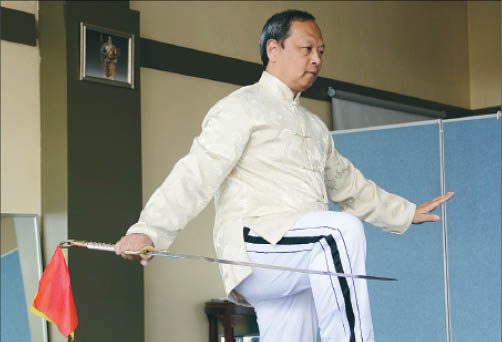
Home » Far East training, far from home
Far East training, far from home

June 2, 2011
As more U.S. people pay attention to China and its emerging economy, a husband-and-wife team has launched a new business in downtown Spokane with an eye toward helping others better understand their native country.
Steve Wang and his wife, Yan Meng, opened the Chinese Culture House & ZW Tai Chi Studio in April at 827 W. Second, at the southeast corner of Second Avenue and Lincoln Street. The business offers a variety of classes in Chinese language, cultural understanding, ancient martial arts, and consultation for doing business and travel in China.
"China now is different than years ago, and people are paying more attention to it, not just because of its economy, but also because people are beginning to understand its culture and beauty," says Wang.
He came to Spokane from China in 1995 to complete a master's degree in international management at Whitworth College, now Whitworth University. His wife followed him to Spokane in 1996.
Wang says that although he's done some previous business consulting work here related to Chinese culture, including for Gibby Media Group Inc. in Spokane Valley, he hopes to do more of that type of work for businesses through the Chinese Culture House. He says he's been invited to give presentations to students at Spokane Community College and Spokane Falls Community College.
Wang also has had early discussions with Eastern Washington University about assisting with a possible Chinese culture and language program, he says, but those plans are probably for a year or two from now.
Currently, Wang and Meng have a total of about five students in three different Chinese language and culture classes. The business also offers private language tutoring.
Wang was principal for two years for the Spokane Chinese Language School, which held a class on the Gonzaga University campus on Saturday afternoons, but he recently left that position to focus on the new business.
He and his wife also hope to launch a Chinese folk dance class led by a separate instructor who has more than 25 years of experience.
Overall, Wang believes his business offers services that people in the Spokane-Coeur d'Alene area will seek out as a way to better understand China and its people.
"People do have the interest but also the demand of learning and understanding Chinese culture and language," he says. The 2008 Olympics held in Beijing helped open up more of those doors, he says.
"Now people don't think China equals communism," Wang adds. "China's culture is thousands of years old and was not just created by some government or authority. The culture stays and the beauty of the country stays. I want to share that."
The couple also hosts week-long culture camps for children that run during school breaks. Scheduled from 10 a.m. to 3 p.m. with a lunch, the camps introduce students to some basic Chinese, a cultural video, jump-rope games, art with paper cutouts, and basic martial arts.
"We call it Kung Fu time," says Wang, who teaches them simple moves. Meng adds, "The kids are so crazy about it."
Five students attended the spring break culture camp in April, including a few children adopted from China that live with families here now, she says. The summer camps will start June 20.
Since completing his studies at Whitworth, Wang has worked for several companies in international marketing, mainly focused on the Chinese market. He also had an import-export business briefly, but he says the Chinese Culture House soon became his dream.
"I believe whatever you are doing with a business or communicating with people from different cultures, you have to understand the cultures first," he says, adding that while people may learn a different language, having a better understanding of another culture is equally as important.
Part of that culture for Wang is teaching the history and meaning behind the traditional martial arts of Tai Chi and Hsing-I, which is also known as XingYi. He describes Hsing-I as an exercise of body and mind, and he contends that it is most helpful in self-defense.
He also teaches Chi Kung or Qigong, the Chinese breathing meditation which is considered in China to have many healing benefits, he says.
Wang learned these arts from age 11 as he grew up in the Sichuan Province, in southwest China. His hometown is the city of Chongqing, where he lived until coming to the U.S.
He says the ancient martial arts teach about internal power, or energy released from within, and that Chinese people value them for improving health as well as for self-defense. The business holds several Tai Chi, Hsing-I and Qigong classes, including two different kinds of Tai Chi—one that Wang refers to as fitness or wellness Tai Chi and another that he calls self-defense Tai Chi Kung Fu. He holds both beginning and intermediate classes.
The classes range in cost from $55 to $65 per session, which run for six or eight weeks, depending on the class. A class during a session is usually held once a week, but some of them are held twice a week. He also provides private lessons that cost about $25 to $30 per hour.
The business has about 700 square feet of space, with an area for martial arts in the front and a small classroom in the back.
For cultural classes, Wang describes teaching about important values in China, including respect for seniors, loyalty to authority, and always caring for family members. He also explains the impacts from thousands of years of civilization, including the ancient philosophy known as Confucianism, doctrines such as Taoism, and the many Chinese dynasties.
Latest News
Related Articles




